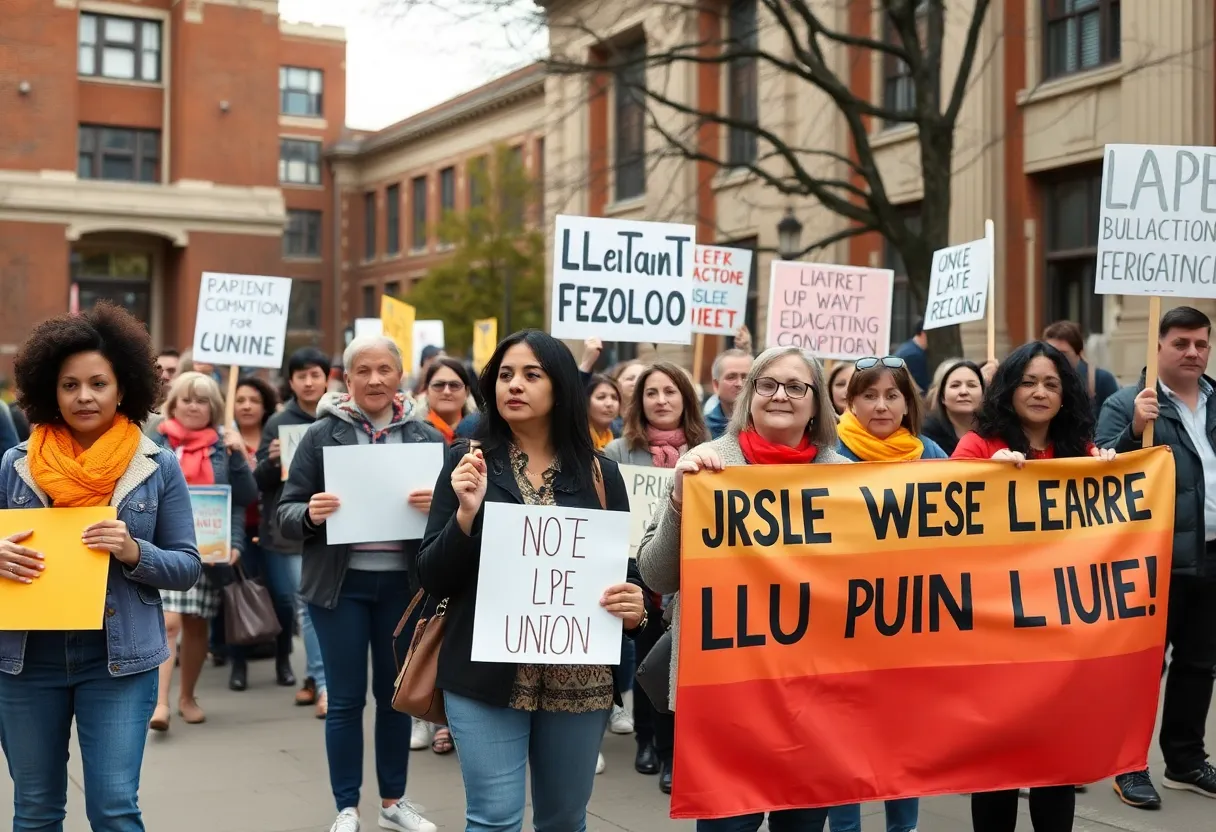News Summary
Loyola Marymount University has decided not to recognize the faculty union for non-tenure-track educators, citing a religious exemption. This move follows nearly a year of contract negotiations and has led to a strike authorization vote among faculty members, many of whom feel betrayed and are advocating for better wages and job security. The university argues that union proposals threaten financial stability, while faculty members contend that their demands are reasonable. The situation reflects broader challenges facing non-tenured faculty across Southern California.
Los Angeles, CA – Loyola Marymount University (LMU) has declared it will no longer recognize the faculty union representing non-tenure-track educators, invoking a religious exemption from the National Labor Relations Board (NLRB). This announcement was made on September 12 and follows approximately 10 months of contract negotiations between the university and the union.
LMU’s president, Thomas Poon, explained that the decision was made to maintain the institution’s autonomy and to align with its Catholic mission without third-party interference. The university argues that the religious exemption is essential for ensuring financial sustainability, claiming that union proposals could lead to significant tuition increases and potential layoffs.
Nearly 400 educators are directly affected by this decision, many of whom had been negotiating for improvements in wages, job security, and overall working conditions. Faculty members expressed feelings of shock and betrayal, stating that they felt blindsided after engaging in negotiations with the administration.
The union representing the faculty, SEIU Local 721, was officially certified last summer after two years of organization. In response to the recent developments, faculty members have initiated a strike authorization vote aimed at pressuring the university to return to the bargaining table. This vote will conclude on September 30 and reflects faculty concerns over the university’s refusal to negotiate in good faith.
LMU’s spokesperson, Griff McNerney, expressed disappointment regarding the strike vote, indicating that it poses a risk to disrupting student instruction and overall experience. Faculty members have highlighted pressing issues such as low wages and short-term contracts, which are key motivators behind the formation of the union and the ongoing protests.
There has been a noticeable increase in labor organizing efforts by non-tenured faculty across various universities in Southern California, amidst a growing trend of resistance to academic unions. The NLRB, which oversees unionization efforts and protects employee rights, is argued by LMU to be outside its jurisdiction due to the religious exemption. Past court rulings, including a Supreme Court decision from 1979, support the notion that religious institutions may invoke such exemptions to avoid unionization.
Union members countered LMU’s claims regarding financial sustainability, arguing that the legal challenges raised by the university are unfounded. They contend that the faculty’s proposals account for living costs and are not as detrimental financially as suggested by LMU. Although the university has introduced a range of salary increases and professional development opportunities following the union’s formation, faculty members argue these measures are insufficient and do not address fundamental issues.
Many untenured faculty are advocating for improved pay structures and job security, positioning these elements as critical components of collective bargaining success. Comparatively, at the University of Southern California (USC), untenured faculty are encountering similar obstacles in their attempts to form a union, with university officials arguing that they are managerial employees, which renders them ineligible for unionization.
The ongoing faculty organizing efforts at both LMU and USC indicate a significant shift in labor relations within higher education. This complex landscape continues to evolve, with administrative resistance and financial constraints complicating the unionization process, as educators push for fairer working conditions and terms in a challenging economic environment.
Deeper Dive: News & Info About This Topic
HERE Resources
Additional Resources
- LAist: USC, LMU Non-Tenure Track Faculty Union
- Wikipedia: Faculty Unionization
- Los Angeles Times: LMU Stops Bargaining with Faculty Union
- Google Search: Faculty Unionization
- The Loyolan: Timeline of Non-Tenure Track Faculty Collective Action
- Encyclopedia Britannica: Labor Union
- LAist: LMU Faculty Union Strike Authorization Vote
- Google News: LMU Faculty Union
Author: STAFF HERE LOS ANGELES WRITER
The LOS ANGELES STAFF WRITER represents the experienced team at HERELosAngeles.com, your go-to source for actionable local news and information in Los Angeles, Los Angeles County, and beyond, specializing in "news you can use" with coverage of product reviews for personal and business needs, local business directories, politics, real estate trends, neighborhood insights, and state news affecting the area—with deep expertise from years of dedicated reporting and strong community input, including local press releases and business updates, while delivering top reporting on high-value events like the Academy Awards, LA Auto Show, and Los Angeles Marathon, extending coverage to key organizations such as the Los Angeles Area Chamber of Commerce and the Los Angeles Tourism & Convention Board, plus leading businesses in entertainment and technology like Warner Bros. and SpaceX, and as part of the broader HERE network including HEREAnaheim.com , HERECostaMesa.com , HEREHuntingtonBeach.com , and HERESantaAna.com , providing comprehensive, credible insights into Southern California's dynamic landscape. HERE Anaheim HERE Beverly Hills HERE Coronado HERE Costa Mesa HERE Hollywood HERE Huntington Beach HERE Long Beach HERE Los Angeles HERE Mission Viejo HERE San Diego HERE Santa Ana





